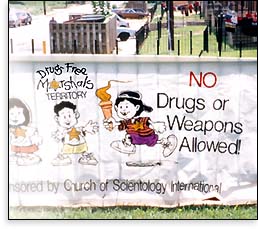
|

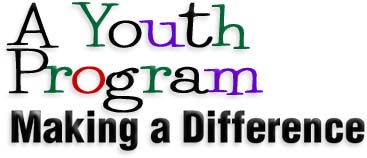
By Steven F. Ayre
An international youth anti-drug program has created legions of kids empowered to make the right decisions about drugs. Freedom examines the program’s impact and results in one American city.

n the spring of 1997, Reverend Diane Stein and Susan Webb, staff members at the Church of Scientology in Atlanta, Georgia, received the first of what would become regular phone calls for help in drug-related community crises. “There was a shooting,” a member of the Atlanta mayor’s office staff told them. “Can you help?”
Drug-related crime in the inner city had taken yet another victim, and the city was on edge. Webb was asked to show up in the community in force with marshals to help children deal with the news and prevent future violence.
The marshals requested were Drug-Free Marshals, members of the international youth drug education and prevention program created and sponsored by the Church of Scientology.
Responding to similar calls over the past two and a half years, Stein, Webb, volunteers and the Drug-Free Marshals have helped numerous communities throughout the greater Atlanta area, which is no stranger to drug-related violence.
The Right Choices
The Drug-Free Marshals program was created to empower children to make the right choices about drugs and to exercise responsibility in handling the drug problem and its consequences.
The program was launched in Los Angeles on April 3, 1993 by the Church of Scientology International. At that time, FBI Special Agent Brent Braun, director of the FBI’s Los Angeles office’s Drug Demand Reduction Program, conducted a swearing-in ceremony, installing 200 children as the first Drug-Free Marshals.
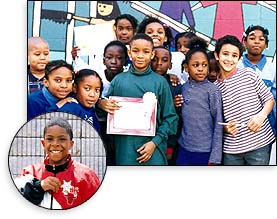
|
 |
Atlanta youth participants in the international Drug-Free Marshals program are contributing to safer communities. |
 |
The grass-roots program rapidly spread through the United States and to Canada, Mexico and overseas. While the program appears under different names in some countries, it follow the same simple steps to educate children about drugs and to empower them with responsibility in a way that program organizers say no other drug education program does.
“The way we talk to kids about drugs is very different from other programs you see today,” said Stein, noting that many programs simply assert that “‘drugs are bad, they will kill or hurt you, so don’t do them.’” Such an approach often seems to children to be an enforcement of adult ideas, neither consulting their understanding nor enabling them to come to their own decision. As a result, the warnings are often rejected and the opposite of the desired effect is achieved.
Stein said that she and others who work with the program strive to put the children in control. “Whether or not they choose to take drugs is totally up to them. We don’t say, ‘We’re the big adults and we say “No!” and that’s the way it is.’
“We educate kids six years old and up on what a drug does to them, and how using it is a trap. We explain why it may make them ‘feel good’ for a short period, but what actually will happen to them if they take it. The children really understand what we’re talking about,” she said.
After the drug education step, youth are sworn in as Drug-Free Marshals, taking a pledge that encourages them to be responsible for keeping not only themselves but their friends, family and everybody else in society drug-free.
Campaign organizers and volunteers continue to work with youth after they are sworn in, organizing essay contests and helping kids plan and carry out events, such as visits to business owners, police, city officials, and state and federal legislators. “We really stress making this program theirs,” said Stein. “It works better when you treat them with respect, and let them take charge. After all, they’re the ones who aren’t abusing drugs.”
Children in the program get enthusiastic over spreading the word against drugs and expanding their own ranks — adults included. Thousands of religious leaders, judges, mayors, law enforcement and government officials, celebrities and concerned adults around the world have been sworn in by Drug-Free Marshals youth participants, and support the program avidly.
An Olympian Challenge
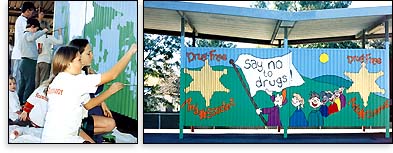
|
 |
Constructive community projects for youth, such as refurbishing run-down train stops in Australia, are conducted under the banner of the anti-drug campaign internationally. |
 |
The Drug-Free Marshals movement in Atlanta began in late 1994 when Rev. Stein was meeting with Michael Langford, community affairs director for Mayor Bill Campbell, on joint community concerns. Stein presented information about different Church community programs offered around the nation, and a decision was made to start the Drug-Free Marshals program in the city.
Langford asked for one commitment: that the Church swear in 1,996 new Drug-Free Marshals by the time the Olympics arrived in town in 1996.
Stein began holding events at Camp Best Friends, the city’s summer day camp program for inner city youth, which serves 75,000 children.
She far surpassed the goal set in the 1994 meeting. And by the time the Olympics started, the Mayor’s office was so swamped with Olympiad business that it lacked adequate resources for the summer activities of its inner-city youth program.
In response to a call for help from the Mayor’s office, Church volunteers were soon holding an average of six Drug-Free Marshals events every day throughout the Olympics at various city-sponsored camps, reaching thousands more children.
As a result of the Olympian efforts, Mayor Campbell, a Drug-Free Marshal himself, declared July 31, 1996 Drug-Free Marshals Day, and Georgia Governor Zell Miller proclaimed July 1996 Drug-Free Marshals Month. At the state signing ceremony, the governor was also sworn in as a Drug-Free Marshal. “He will make a great drug-free role model for kids,” commented one 10-year-old marshal at the occasion.
Declarations of a day and a month in recognition of the Drug-Free Marshals, and their continued dedication to achieving a drug-free city, have been repeated each year.
Reaching a City
As new Drug-Free Marshals have continued to swear in further marshals all over the city, their ranks have swelled.
“More important than numbers are the responses we see from the kids and those working with them.” – Rev. Diane Stein
|
|
“We kept track of the number of children sworn in for about three years,” Stein recalls. “When we surpassed 40,000, we started counting in terms of thousands.” She estimates that more than 150,000 children have participated in the program in Atlanta and surrounding cities and towns. “But more important than numbers are the responses we see from the kids and those working with them,” she adds.
Langford summed up the achievements of the team. “The Drug-Free Marshals are out in the community every day, helping take drugs out of the children’s hands, and this has benefited the city’s drug program as well as the city. The Drug-Free Marshals campaign has been a driving force in the community for years now, and I intend to work with the Church of Scientology until we win this war on drugs.”
Winning that war means reaching virtually all children throughout the greater Atlanta area — a task that the Drug-Free Marshals have taken in stride.
Working with the school systems in Atlanta and surrounding cities such as East Point, volunteers hold up to 100 Drug-Free Marshals drug education and swearing-in events each week. The children are assembled into small groups so that more direct attention can be given to each. The same applies to youth functions sponsored by the city of Atlanta outside the schools, sometimes involving thousands of children. The kids are divided into small groups and brought to the Drug-Free Marshals for the initial education and swearing-in ceremony.
The results of this approach speak for themselves.
“Many children have told me the decisions they have made not to take drugs, after going through the Drug-Free Marshals program,” said Joy Coffee, a counselor at two Atlanta elementary schools. “One 5th grader told me that even though all his family took drugs, and he had tried them himself, too, he had decided to quit them. He knew that by doing so, and staying at school, he could make it out of the life in the projects, and that was what he was going to do.”
Drugs and Morals
As an outgrowth of the success of the Drug-Free Marshals movement, organizers and volunteers have also instituted activities to introduce children to the subject of morals in response to community demand — particularly in areas where drug-related violence has occured.
“Kids, especially the younger ones, might well be certain now that they will never take drugs, and they have peer agreement on that,” said Susan Webb, who directs community activities for the Church of Scientology in Atlanta. “But what happens when they move into their teens, and that peer agreement falls apart, and they feel the pressure to try a drug? If kids have little grasp of morals or the integrity gained from exercising them, they can fall down right there.”
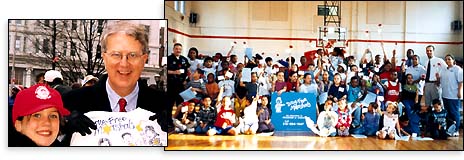
|
 |
Large groups and entire student bodies take part in the program, as in Philadelphia (right). Children secure support from adults; the Governor of Georgia, Roy Barnes, displays a Drug-Free Marshals t-shirt (left). |
 |
Volunteers with the Drug-Free Marshals program instituted the “anti-violence event,” at which copies of a booklet, The Way to Happiness, are distributed by volunteers and community affairs staff of the mayor’s office.
The publication contains 21 common-sense and time-honored moral precepts such as “Be Temperate,” “Honor and Help Your Parents,” “Set a Good Example” and “Don’t Do Anything Illegal.” More than 55 million copies of The Way to Happiness, written by American author and humanitarian L. Ron Hubbard, have been distributed in 31 languages throughout the world since it was first published in 1981. Though Mr. Hubbard is also the founder of the Scientology religion, as an author and humanitarian his non-religious discoveries and writings on the topics of ethics, morals, education, drug rehabilitation and criminal reform have been in use in virtually all settings.
Susan Webb recalls one group of children at the Thomasville Heights housing project who were sworn in as Drug-Free Marshals and then provided The Way to Happiness booklets. “First of all, the children decided to give the booklets to the people in the community who were making it so bad,” Webb recalls, also recounting how one boy approached a police officer and told him he wasn’t needed anymore, as there was a new, Drug-Free Marshal in town. The boy also inquired of the policeman if he was a Drug-Free Marshal. “When the police officer said that he was not, the boy promptly swore him in.”
“This program has had a huge impact on the tens of thousands of children we reach each year in the city, motivating them to stay off drugs,” said Sunshine Lewis, Mayor of Atlanta office staff member. “I’ve heard people say that if this program reaches just one child, it is worth it. I know we can save them all with it.”
Making a Difference
Webb notes that she encounters many children who participated in the Drug-Free Marshals program in the early days. “They tell us now, ‘I said “No!” to drugs because of the Drug-Free Marshals.’ And there’s nothing more rewarding from the program than to hear teenagers and young adults say that.”
Declining juvenile crime statistics in Atlanta are also very encouraging, attributed by city officials to an effective working relationship between the city and churches. “I attribute this directly to the successful partnership with our religious community,” said Mayor Campbell.
Lt. Melvin Douglas, Director of Community Policing for the police of the closely neighboring city of East Point, concurs. “The Church of Scientology’s Drug-Free Marshals campaign is one of the best I’ve worked with. Not only is it fun for the children, but it really helps with the biggest problem facing youth today,” he said. “Our communities need to stand together to win the war on drugs. We will win, but only if programs like the Drug-Free Marshals continue to do what they are doing.”
Stein concludes that the war will ultimately be won by creating a new generation of drug-free individuals. “If we concentrate on the kids, they will be running the whole world in the near future,” she said. “Mr. Hubbard once said that ‘When children become unimportant to society, that society has forfeited its future.’ That about says it all. If we empower children, through education, to make the right decisions about drugs, then we will create the first generation of drug-free people.
“It will make a huge difference in reducing the crime, violence and other social ills that we face today.”
Judging by the success of the program to date, that difference is already being felt.
* For more information on the Drug-Free Marshals campaign, write to Drug-Free Marshals Coordinator, Church of Scientology International, 6331 Hollywood Boulevard Suite 1200, Los Angeles, California 90028 or call (323) 960-3500. Also visit the Drug-Free Marshals website at http://www.drugfreemarshals.org
|

|

